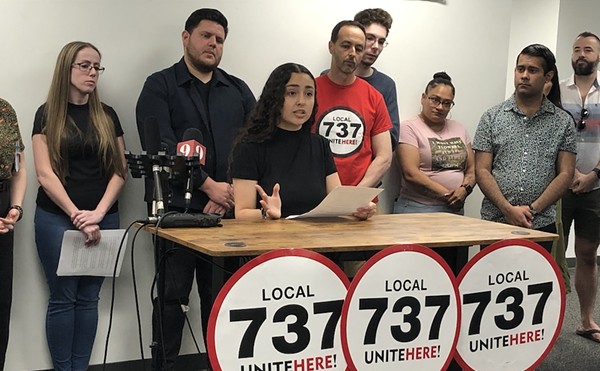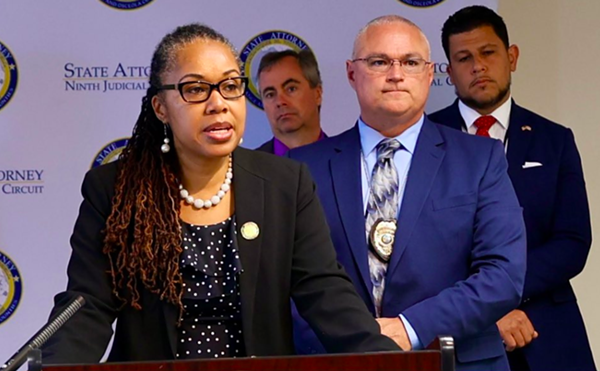Student suicide at Florida Polytechnic spurs debate on mental health services
By Lloyd Dunkelberger, News Service of Florida on Thu, Sep 13, 2018 at 1:09 pm
The recent suicide of a student at Florida Polytechnic University has drawn attention to the state university system’s efforts to deal with mental-health issues.
After the Aug. 1 death of the student, the United Faculty of Florida, a union that has clashed with the Florida Polytechnic administration over personnel issues, criticized the school’s decision to switch from an on-campus counselor to an off-campus provider of mental-health services.
In a report shortly after the student’s death, the Tampa Bay Times raised a question about whether the tragedy could have been prevented if an on-campus counselor was available.
“While no one will ever know the answer to that question, UFF is concerned that Florida Polytechnic abruptly became the only university in the state of Florida without full-time, on-site mental health counselors,” the union said in a statement.
The union also noted that the Board of Governors, which oversees the 12 state universities, had encouraged schools to meet a national standard of having at least one mental-health counselor for every 1,500 students.
But in an appearance Wednesday before a task force set up by the Board of Governors to look at mental-health, drug and alcohol issues on campuses, Florida Polytechnic President Randy Avent defended the school’s decision to change its mental-health services, saying it was done in “a very methodical, well-thought out, deliberate manner that had student safety in mind.”
He said the new system, which involves a contract with BayCare, a Tampa Bay area health-care provider, offers more-comprehensive services for students, including a 24-hour, seven-day-a-week system with guaranteed response times.
As a school with just over 1,400 students, Avent said it would have been easy to keep an on-campus counselor and even bring in another and meet the counselor-student standard. But he said beginning last fall the school began looking at changing the system. After the review, the on-campus counselor was given a 30-day termination notice in late June.
One advantage that the BayCare system has is it provides a much larger range of mental-health expertise, Avent said.
“We have students with a wide spectrum of mental-health challenges,” Avent said, citing mood, personality and sexual-identity issues. “It is impossible that a single counselor would have the expertise to deal with all of those different challenges.”
He also said there are times when an on-campus counselor is off duty or on vacation, and the former system could not respond when student demands for services increased. “There is no ability to scale as demand increased during stressful times like exams,” Avent said.
Avent said arranging a contract with BayCare “sounds impersonal.”
“People generally think we go around and hand out pamphlets and give phone numbers to students. But that’s not the case,” Avent said.
He said BayCare provides a counselor who comes to campus every week, and hours can be increased if student demand for services increases. There are also arrangements for students to see counselors off campus if they desire, Avent said.
In addition, Florida Polytechnic has recently hired a caseworker who will work full-time on campus and be an advocate for students, helping them connect with necessary services. And unlike counselors, who have medical privacy restrictions, Avent said the caseworker can keep faculty and administrators informed about students who need help.
But Avent said the provision he is “proudest” of in the BayCare contract is the guaranteed response times, ranging from a maximum of six hours for students in emergency situations to no more than three days for more-routine problems.
“That’s something that we could have never provided on our own,” Avent said. “We never have to worry about students not being able to be seen.”
He also dismissed concerns that the school was using a private contractor as “a cost-cutting measure.”
“In fact, at a very minimum, we more than doubled our investment with this new approach, and we’re sure it’s going to provide the best care to our students,” Avent said.
Alan Levine, a health-care executive who is a member of the Board of Governors, told Avent the changes in the Florida Polytechnic system “make absolute sense.”
But as the board continues its ongoing discussion about mental-health services, Levine raised the issue of how far the state system is obligated, particularly with students who need longer-term care.
“We can help keep students stable and focused. But the intent of these services is not to have them enter those services and remain in those services for deep-dive treatment,” Levine said, noting there are “more appropriate” options for those cases.
“I’m worried people are expecting you and our universities to solve all those problems when you’re not equipped to do that,” Levine told Avent.
One possibility discussed by task-force members was a requirement that all students have health insurance. Currently, only Florida State University has that mandate, with provisions to cover costs for students who cannot afford coverage.
Fernando Valverde, who is chairman of the task force and a regional president for the health insurer Humana, said a lower-cost option would be trying to arrange insurance coverage just for mental-health services. He estimated it would only cost students about $10 a month under current market conditions.
The task force will continue its discussion of mental-health, drug and alcohol issues at a meeting in November. Wednesday’s discussion was part of a two-day meeting being held by the Board of Governors at New College of Florida in Sarasota.
After the Aug. 1 death of the student, the United Faculty of Florida, a union that has clashed with the Florida Polytechnic administration over personnel issues, criticized the school’s decision to switch from an on-campus counselor to an off-campus provider of mental-health services.
In a report shortly after the student’s death, the Tampa Bay Times raised a question about whether the tragedy could have been prevented if an on-campus counselor was available.
“While no one will ever know the answer to that question, UFF is concerned that Florida Polytechnic abruptly became the only university in the state of Florida without full-time, on-site mental health counselors,” the union said in a statement.
The union also noted that the Board of Governors, which oversees the 12 state universities, had encouraged schools to meet a national standard of having at least one mental-health counselor for every 1,500 students.
But in an appearance Wednesday before a task force set up by the Board of Governors to look at mental-health, drug and alcohol issues on campuses, Florida Polytechnic President Randy Avent defended the school’s decision to change its mental-health services, saying it was done in “a very methodical, well-thought out, deliberate manner that had student safety in mind.”
He said the new system, which involves a contract with BayCare, a Tampa Bay area health-care provider, offers more-comprehensive services for students, including a 24-hour, seven-day-a-week system with guaranteed response times.
As a school with just over 1,400 students, Avent said it would have been easy to keep an on-campus counselor and even bring in another and meet the counselor-student standard. But he said beginning last fall the school began looking at changing the system. After the review, the on-campus counselor was given a 30-day termination notice in late June.
One advantage that the BayCare system has is it provides a much larger range of mental-health expertise, Avent said.
“We have students with a wide spectrum of mental-health challenges,” Avent said, citing mood, personality and sexual-identity issues. “It is impossible that a single counselor would have the expertise to deal with all of those different challenges.”
He also said there are times when an on-campus counselor is off duty or on vacation, and the former system could not respond when student demands for services increased. “There is no ability to scale as demand increased during stressful times like exams,” Avent said.
Avent said arranging a contract with BayCare “sounds impersonal.”
“People generally think we go around and hand out pamphlets and give phone numbers to students. But that’s not the case,” Avent said.
He said BayCare provides a counselor who comes to campus every week, and hours can be increased if student demand for services increases. There are also arrangements for students to see counselors off campus if they desire, Avent said.
In addition, Florida Polytechnic has recently hired a caseworker who will work full-time on campus and be an advocate for students, helping them connect with necessary services. And unlike counselors, who have medical privacy restrictions, Avent said the caseworker can keep faculty and administrators informed about students who need help.
But Avent said the provision he is “proudest” of in the BayCare contract is the guaranteed response times, ranging from a maximum of six hours for students in emergency situations to no more than three days for more-routine problems.
“That’s something that we could have never provided on our own,” Avent said. “We never have to worry about students not being able to be seen.”
He also dismissed concerns that the school was using a private contractor as “a cost-cutting measure.”
“In fact, at a very minimum, we more than doubled our investment with this new approach, and we’re sure it’s going to provide the best care to our students,” Avent said.
Alan Levine, a health-care executive who is a member of the Board of Governors, told Avent the changes in the Florida Polytechnic system “make absolute sense.”
But as the board continues its ongoing discussion about mental-health services, Levine raised the issue of how far the state system is obligated, particularly with students who need longer-term care.
“We can help keep students stable and focused. But the intent of these services is not to have them enter those services and remain in those services for deep-dive treatment,” Levine said, noting there are “more appropriate” options for those cases.
“I’m worried people are expecting you and our universities to solve all those problems when you’re not equipped to do that,” Levine told Avent.
One possibility discussed by task-force members was a requirement that all students have health insurance. Currently, only Florida State University has that mandate, with provisions to cover costs for students who cannot afford coverage.
Fernando Valverde, who is chairman of the task force and a regional president for the health insurer Humana, said a lower-cost option would be trying to arrange insurance coverage just for mental-health services. He estimated it would only cost students about $10 a month under current market conditions.
The task force will continue its discussion of mental-health, drug and alcohol issues at a meeting in November. Wednesday’s discussion was part of a two-day meeting being held by the Board of Governors at New College of Florida in Sarasota.

WE LOVE OUR READERS!
Since 1990, Orlando Weekly has served as the free, independent voice of Orlando, and we want to keep it that way.
Becoming an Orlando Weekly Supporter for as little as $5 a month allows us to continue offering readers access to our coverage of local news, food, nightlife, events, and culture with no paywalls.
Scroll to read more Orlando Area News articles
Newsletters
Join Orlando Weekly Newsletters
Subscribe now to get the latest news delivered right to your inbox.


















